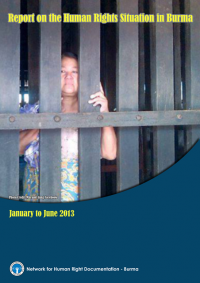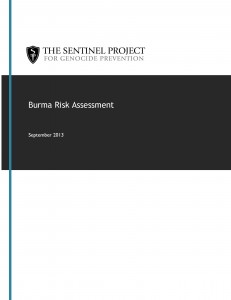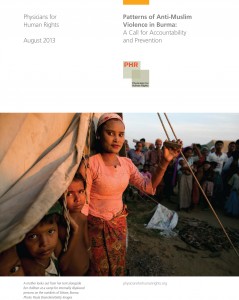Crimes Against Humanity (194 found)
The Use of Section 18 to Continue Human Rights Abuses in Burma
Section 18 of the Peaceful Assembly and Peaceful Procession Law is being frequently utilized to arrest and imprison political activists for undertaking human rights activism in Burma. AAPP (B) wishes to highlight the ongoing human rights abuses section 18 permits and to make the international community aware of the dangers this poses to the political freedom in Burma […]
• • •Report on the Human Rights Situation in Burma (January 2013 – June 2013)
 Over the six months from January to June 2013, ND-Burma documented 147 human rights violations across Burma. These violations occurred in areas of armed conflict but also in areas covered by ceasefires. Each violation is a specific incident, but it may involve any number of victims, from one victim of killing, to forced labor involving many victims, to the forced displacement of an entire village. ND-Burma’s findings demonstrate that, despite progress in reaching ceasefire agreements with non-state armed groups, the government has made little progress protecting the human rights of its citizens. Furthermore, continued arrests of human rights defenders demonstrate that the government is not serious about working with civil society to protect human rights […]
Over the six months from January to June 2013, ND-Burma documented 147 human rights violations across Burma. These violations occurred in areas of armed conflict but also in areas covered by ceasefires. Each violation is a specific incident, but it may involve any number of victims, from one victim of killing, to forced labor involving many victims, to the forced displacement of an entire village. ND-Burma’s findings demonstrate that, despite progress in reaching ceasefire agreements with non-state armed groups, the government has made little progress protecting the human rights of its citizens. Furthermore, continued arrests of human rights defenders demonstrate that the government is not serious about working with civil society to protect human rights […]
Burma Update: Serious Crimes Continue
This briefing paper summarizes crimes that have been committed in Burma over the last year. It details the ongoing abuses and restrictions against Rohingyas, continuing anti-muslim violence, restrictive legislations being used to arrest and prosecute activists, farmed and human rights defenders, and the Burma Army’s offensives against the Kachin Independence Army and other non-state armed groups despite peace agreements.
• • •68th Session of the UN General Assembly – Situation of human rights in Myanmar: Report of the Special Rapporteur on the situation of human rights in Myanmar, Tomas Ojea Quintana
In the present report to the United Nations General Assembly, the Special Rapporteur describes how the reforms under way in Myanmar continue to create the prospect of significant improvements in the human rights situation. Important developments during the reporting period include the continuing release of prisoners of conscience; improving respect of the right to freedom of opinion and expression; and progress towards agreement on a national ceasefire. The Special Rapporteur highlights, however, the dangers of glossing over shortcomings in the area of human rights or presuming that these shortcomings will inevitably be addressed through the momentum of current reforms […]
• • •Burma Risk Assessment
 Following extensive research, the Sentinel Project has concluded that the risk of genocide or related mass atrocities in Burma is extremely high. Despite recent democratic reforms in the country, violence, discrimination, and extrajudicial killings continue and are mostly directed toward the Muslim Rohingya minority in Rakhine state. Violence and other crimes against the Rohingya, which are conducted by both state and non-state groups, are both widespread and systematic […]
Following extensive research, the Sentinel Project has concluded that the risk of genocide or related mass atrocities in Burma is extremely high. Despite recent democratic reforms in the country, violence, discrimination, and extrajudicial killings continue and are mostly directed toward the Muslim Rohingya minority in Rakhine state. Violence and other crimes against the Rohingya, which are conducted by both state and non-state groups, are both widespread and systematic […]
Patterns of Anti-Muslim Violence in Burma: A Call for Accountability and Prevention
 In this report, PHR documents how persecution of and violence against the Rohingya in Burma has spread to other Muslim communities throughout the country. PHR conducted eight separate investigations in Burma and the surrounding region between 2004 and 2013. PHR’s most recent field research in early 2013 indicates a need for renewed attention to violence against minorities and impunity for such crimes […]
In this report, PHR documents how persecution of and violence against the Rohingya in Burma has spread to other Muslim communities throughout the country. PHR conducted eight separate investigations in Burma and the surrounding region between 2004 and 2013. PHR’s most recent field research in early 2013 indicates a need for renewed attention to violence against minorities and impunity for such crimes […]
Human Rights Abuses Since Thein Sein Became President
It is now more than two years since Thein Sein became President, yet Burma still has one of the worst human rights records in the world. Since Thein Sein became President, human rights abuses which violate international law have actually increased. Burma Campaign UK is receiving increased numbers of reports of rape by the Burmese Army and security forces. Hundreds of political prisoners remain in jail, and almost all repressive laws remain in place […]
• • •Resolution on the Situation of Rohingya Muslims
The European Parliament, having regard to its previous resolutions on Burma/Myanmar, in particular those of 20 April 2012[1], 13 September 2012[2] and 22 November 2012[3], having regard to its resolution of 23 May 2013 on reinstatement of Myanmar/Burma’s access to generalised tariff preferences[4], having regard to the EU Foreign Affairs Council conclusions of 22 April 2013 on Myanmar/Burma […]
• • •Protecting Minority Rights Is Non-Negotiable
In its rush to normalize relations with Myanmar, the international community – particularly the United Nations – must not ignore the increase in abuses being committed against ethnic minorities in Rakhine and Kachin States, and it must take a stronger stance in defense of the human rights of affected populations. Ten months after violence forced them into displacement […]
• • •Massacre in Central Burma Muslim Students Terrorized and Killed in Meiktila
This report details the results of a PHR investigation into the March 20 and 21, 2013, attacks on Muslim students, teachers, and residents in the Mingalar Zayyone quarter of Meiktila, a small town in central Burma. A two-person team from PHR conducted 33 interviews about the attacks, which resulted in the deaths of at least 20 children and four teachers […]
• • •
 All posts
All posts